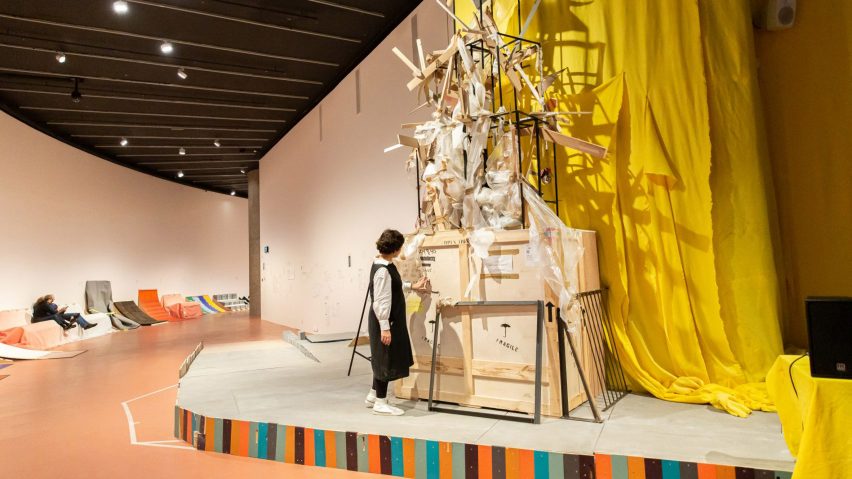
Resolve Collective removes Barbican exhibition following "hostile experiences"
Interdisciplinary design studio Resolve Collective is disassembling its exhibition at London's Barbican Centre and withdrawing its events program in response to a series of negative encounters with staff and the censorship of a Palestinian speaker.
In an Instagram post detailing their experiences at the institution, the collective announced that the Resolve Collective: them's the breaks exhibition, which was set to run until July 16, will be disassembled and left as piles of materials in the gallery space.
View this post on Instagram
The move was made in response to the co-founder of the Palestine-based Radio AlHara Elias Anastas being asked "to avoid talking about free Palestine at length" at an event organised by Abiba Coulibaly and Resolve Collective along with a series of other "shameful incidents".
"We were informed by Abiba and later the Radio AlHara team, of an act of anti-Palestinian censorship by a member of the Barbican comms team," explained the statement. "The Barbican have since offered a sincere apology to Radio Radio AlHara and to ourselves."
"Over the course of our time as Curve Gallery artists, however, we experienced a number of shameful incidents. So, in spite of the apology, we out," it continued.
Barbican intervention "unacceptable"
Following the incident the Barbican apologised to Abiba and Resolve Collective, which is led by Melissa Haniff and brothers Seth and Akil Scafe-Smith, and the event is set to be rescheduled.
"This intervention by the Barbican relating to the content of the talk was unacceptable and a serious error of judgement, for which we are deeply sorry," said the Barbican in a statement.
"As an organisation we believe in the importance of free speech, dialogue and debate – giving a platform to the experiences and views of individuals and groups involved in free Palestine is part of this commitment."
Resolve Collective reported that the incident was the latest in a series of negative interactions with Barbican staff.
"The incident of anti-Palestinian censorship occurred only hours after we had sent an email to the Barbican gallery manager summarising our disappointment at a number of hostile encounters we had experienced from a select few members of the Barbican front of house staff across our exhibition's life span," continued the statement.
"This had included: hostility towards close family and friends at the exhibition opening: heavy-handed and overly-suspicious treatment when entering our exhibition with a group of other Black and Brown artists: and being publicly deprecated and infantilised whilst ushered out of our exhibition space at the end of Gut Level's Cute and Sexy North rave."
Resolve Collective "have been subject to a number of unacceptable experiences"
In response to the incidents, Resolve Collective decided to "exit the Barbican Curve Gallery prematurely". The collective has ended its public program of events at the gallery and will dismantle its exhibition.
A notice on the Barbican's website reads "the Curve Gallery is currently closed".
The exhibition is set to reopen this Monday, with bare walls as a "physical reminder of both ours and Radio AlHara's experiences, holding the institution to account for their promises and making visible the ones they have failed to keep".
In response to the decision, the Barbican said it was supportive of the decision to dismantle the exhibition.
"During the run of their exhibition, Resolve Collective and their collaborators have been subject to a number of unacceptable experiences, which included the events that took place on Thursday 15 June," said Barbican CEO Claire Spencer and artistic director Will Gompertz.
"We are deeply sorry for the pain caused to the members of Resolve Collective and those involved in their exhibition," they said. "Nobody should have to work in a place where they don't feel welcome and respected.
"We are taking this situation extremely seriously and are currently working with the broader Barbican team to understand the details of what happened," they continued. "We are fully supportive of Resolve Collective's decision to change the nature of their exhibition and will work with them to make this possible."
Black artists "cannot be guaranteed to be treated with respect"
Also in the statement, Resolve Collective revealed that it twice previously turned down the opportunity to exhibit at the Barbican due to warnings from other artists.
They concluded that despite supportive individuals, including the exhibition's curator and Dezeen contributor Jon Astbury and Barbican public programme producer Matt Turner, the institution did not treat them with "respect and dignity".
"Our experiences at the Barbican had led us to a frustrating, yet unsurprising, conclusion: that today, despite the best intentions of many good individuals within the institution, young Black artists such as ourselves and other peers who seek to platform their communities, cannot be guaranteed to be treated with respect and dignity when working there," said the statement.
Called Resolve Collective: them's the breaks, the installation contained ramps, platforms and plank-like furniture built from materials that were collected from cultural institutions across London and the south of England.
The collective discussed the installation and how it was designed to be an interactive landscape used for community organisation in a video produced by Dezeen to mark its opening.
"It's actually thinking quite differently about what we would understand to be a gallery or a museum, and thinking quite critically about what that looks like outside of those four walls." said Seth Scafe-Smith at the time.